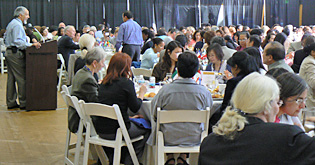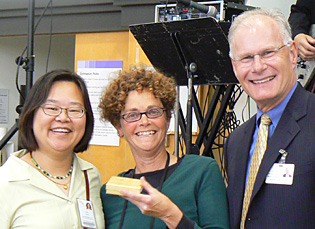
Most people know what UCSF really stands for, but Michael Adams, longtime campus advocate for diversity, joked about the acronym this way: "Usually Caucasian, Sometimes Female."
Adams, director of the Affirmative Action, Equal Opportunity and Diversity office at UCSF, said that's how UCSF could be described in the past "before diversity became a strong value." He noted how far the University has come along in addressing diversity, thanks in part to those attending a luncheon on Oct. 23 to salute best practices in achieving diversity among faculty and staff.
Adams later invited attendees to think of a forward-looking acronym for UCSF that would represent diversity. Some people had fun with the exercise, offering up two new versions: Understanding Culture Supporting Fairness and United Colleagues Stand Forever.
Since 1988, UCSF departments have been asked to complete an affirmative action and diversity progress report each year, describing progress in recruiting diverse candidates, and detailing their actions taken to assure and enhance an atmosphere of acceptance and integration of diverse employees.
The annual luncheon is the occasion to recognize departments receiving high scores on that progress report. This year, Mark Laret, chief executive officer of UCSF Medical Center, presented awards to 34 departments that reported their progress. The Department of Anesthesia has earned recognition and an invitation to the buffet luncheon for seven years in a row.
 |
Michael Adams, director of the Affirmative Action, Equal Opportunity and Diversity office at UCSF, greets attendees at the diversity luncheon.
|
Robert Baron, MD, associate dean of the UCSF School of Medicine and co-chair of the
Chancellor's Advisory Committee on Diversity, says the Chancellor's committee continues to focus its efforts on making recommendations to improve diversity at UCSF. For the past 15 years, more than 1,000 people representing a cross-section of the campus community have worked together on this issue, Baron said.
"Our goal is not only for UCSF to be known as the best place to get medical care and for great science, but also to be thought of as the first to achieve our collective goals about diversity," Baron said.
This year, the diversity committee is asked to review current efforts and to recommend new approaches to nurture and promote diversity among UCSF students, residents, fellows and postdoctoral scholars.
Valuing Diversity
 |
Mark Laret, UCSF Medical Center CEO, presented awards during the Seventh Annual Recognition Luncheon for Best Practices in Staff and Academic Diversity on Oct. 23.
|
In his opening remarks, Laret emphasized the importance of valuing diversity, both globally and locally.
He said there are three reasons why diversity is important. First, diversity is a fact of life. UCSF is located in one of the most diverse cities in the most diverse state in the United States. Projections by the US Census Bureau show that the profile of America's population will continue to diversify. For example, the nation's estimated Hispanic population as of July 1, 2005, is 42.7 million, making people of Hispanic origin the nation's largest ethnic or race minority. By July 1, 2050, the projected Hispanic population is expected to more than double to 102.6 million people.
Second, diversity is a responsibility. UCSF's goal to have the campus community reflect the society in which it operates helps to provide culturally competent and sensitive care, and strengthens the institution when people with different points of view contribute ideas, Laret said.
Third, diversity is an attitude. At the medical center, the principle of diversity is one of its core values. These values are exemplified in the acronym PRIDE, which stands for professionalism, respect, integrity, diversity (committing to the richness of intellect and human experience that can only come from a workforce of widely varied origins, orientations, beliefs and experiences) and excellence.
One area of focus for the medical center is enhancing cultural competency, Laret noted. "We are launching a formalized effort to enhance our patient care providers' abilities to provide culturally appropriate care to our patient population. In the health care world, health disparities across cultures are a major concern, and we are working to reduce this. We have a team working to implement programs to provide more interpreter resources, to provide training to our staff in regard to differences among cultures and to further recruit a staff that more closely matches the cultural demographics of our patient population."
At the luncheon, nine medical center units were recognized for making progress, including medical center administration, ambulatory care, cardiovascular services, clinical services, finance, information technology, strategic development, health plan management/revenue management and UCSF Children's Hospital.
Campus officials noted that there is more room for improvement as the University works toward achieving parity in its hiring.
Photos/Lisa Cisneros


